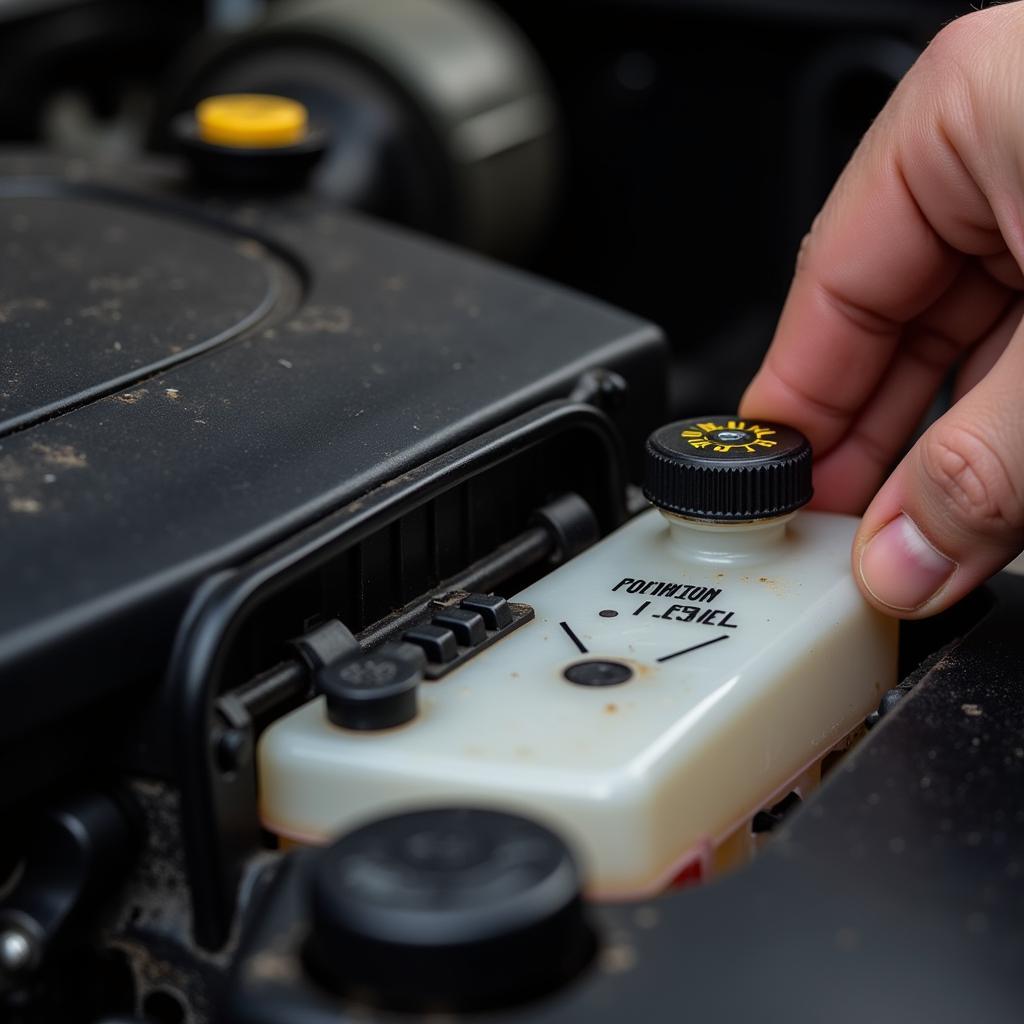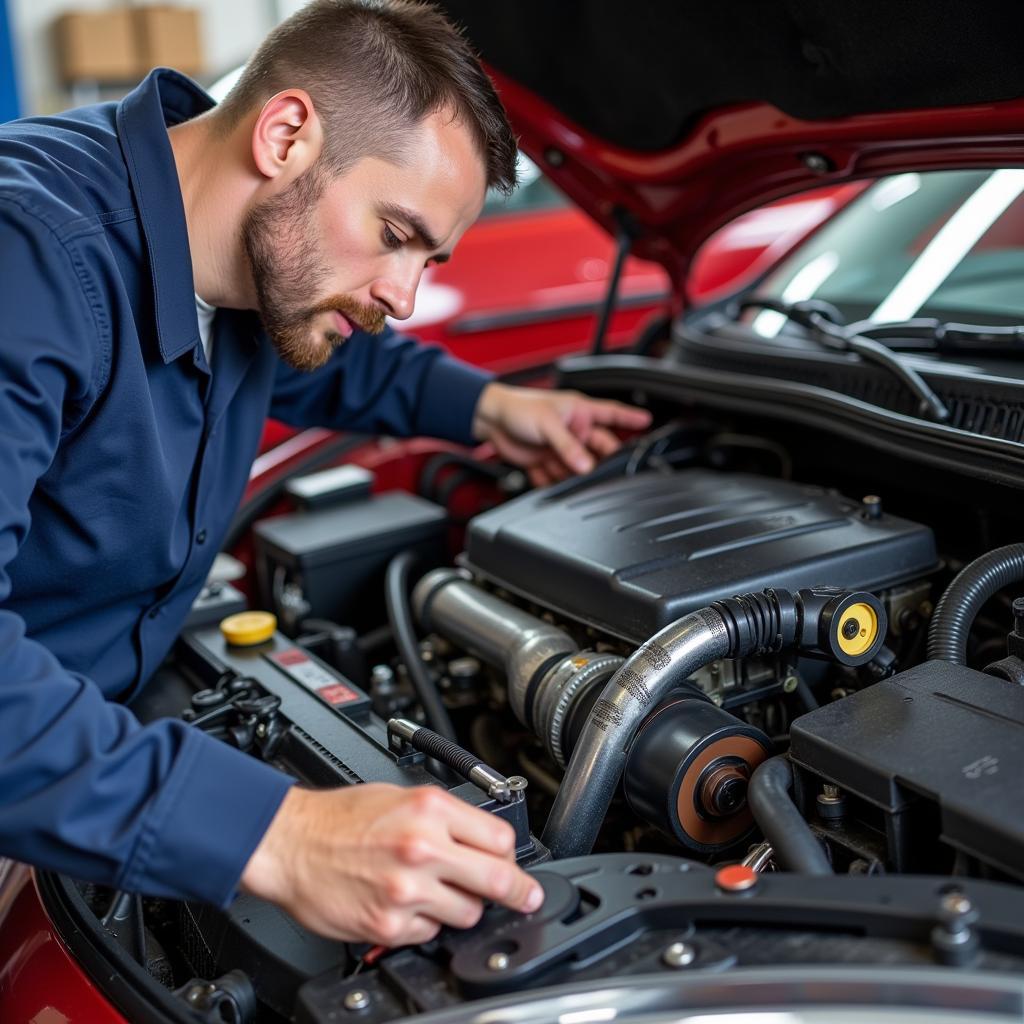An overheating car can be a serious problem, leaving you stranded on the side of the road. Knowing a Quick Fix For Overheating Car situations is crucial for every driver. This guide offers immediate solutions and preventative maintenance tips to keep your engine cool.
What to Do When Your Car Starts Overheating
If your temperature gauge creeps into the red, don’t panic. Pull over safely as soon as possible, turn off the engine, and let it cool down. Never remove the radiator cap while the engine is hot, as this can cause serious burns.
- Turn off the AC and blast the heat: This might seem counterintuitive, but it pulls heat away from the engine and into the cabin.
- Open the hood (once cool): Allowing air to circulate can help dissipate heat.
Once the engine is cool enough to touch, check the coolant level. If it’s low, you can add coolant (or water in an emergency), but only after the engine has cooled down significantly. If you need to add coolant frequently, you likely have a leak that needs to be addressed. You can find helpful tips on how much to fix a head gasket on a car if this becomes an issue.
 A person checking the car’s coolant level in the overflow tank.
A person checking the car’s coolant level in the overflow tank.
Common Causes of Overheating
Understanding why your car overheats is essential for preventing future incidents. Here are some common culprits:
- Low Coolant: The most frequent cause. Leaks, evaporation, or simply not enough coolant can lead to overheating.
- Faulty Thermostat: This regulates the flow of coolant. A stuck thermostat can prevent proper circulation.
- Cooling Fan Issues: Whether electric or mechanical, a malfunctioning fan won’t effectively cool the radiator.
- Clogged Radiator: Debris and buildup can restrict coolant flow.
- Water Pump Failure: The water pump circulates coolant. If it fails, the coolant can’t dissipate engine heat.
- Leaking Head Gasket: A blown head gasket can cause coolant to leak into the engine cylinders or oil passages.
Knowing how to fix a blown fuse in a car can sometimes help, especially if the cooling fan is electrically powered and a blown fuse is the root of the problem.
Preventative Maintenance for a Cool Engine
Regular maintenance is key to preventing overheating.
- Check Coolant Regularly: Make it a habit to check your coolant level at least once a month.
- Flush the Cooling System: Following your car’s recommended maintenance schedule for coolant flushes will prevent buildup and keep the system clean.
- Inspect Hoses and Belts: Look for cracks, leaks, or wear and tear. Replace worn components promptly.
- Test the Thermostat: Ensure the thermostat is functioning correctly and opening at the proper temperature.
- Clean the Radiator: Remove any debris or obstructions blocking airflow to the radiator.
 Mechanic performing a routine car maintenance check-up, focusing on the engine cooling system.
Mechanic performing a routine car maintenance check-up, focusing on the engine cooling system.
Quick Fix for Overheating Car: Expert Advice
John Smith, a certified automotive technician with over 20 years of experience, emphasizes the importance of regular checks: “Just like you check your oil, checking your coolant regularly can prevent a lot of headaches. A little preventative maintenance goes a long way in keeping your car running smoothly.”
He also adds, “If your car does overheat, pulling over immediately is crucial. Continuing to drive can cause severe engine damage.” Remember that sometimes a simple car fixed can save you from more extensive repairs down the line. Don’t underestimate the importance of addressing small issues before they escalate.
Conclusion
A quick fix for overheating car situations starts with understanding the problem and taking swift action. Regular maintenance, however, is the best way to avoid overheating in the first place. By following the tips outlined in this guide, you can keep your engine cool and prevent costly repairs. For further assistance or if you need professional help, connect with us at AutoTipPro. You can reach us at +1 (641) 206-8880 or visit our office at 500 N St Mary’s St, San Antonio, TX 78205, United States.
Is fixing a new bright rc car anything like fixing a real car? While some principles overlap, there are significant differences. If you’re a car enthusiast, working on RC cars can be a fun hobby. If you’re interested in learning how to fix small leak car radiator problems, there are numerous online resources available. Remember, a little knowledge can save you a lot of trouble on the road.






Leave a Reply